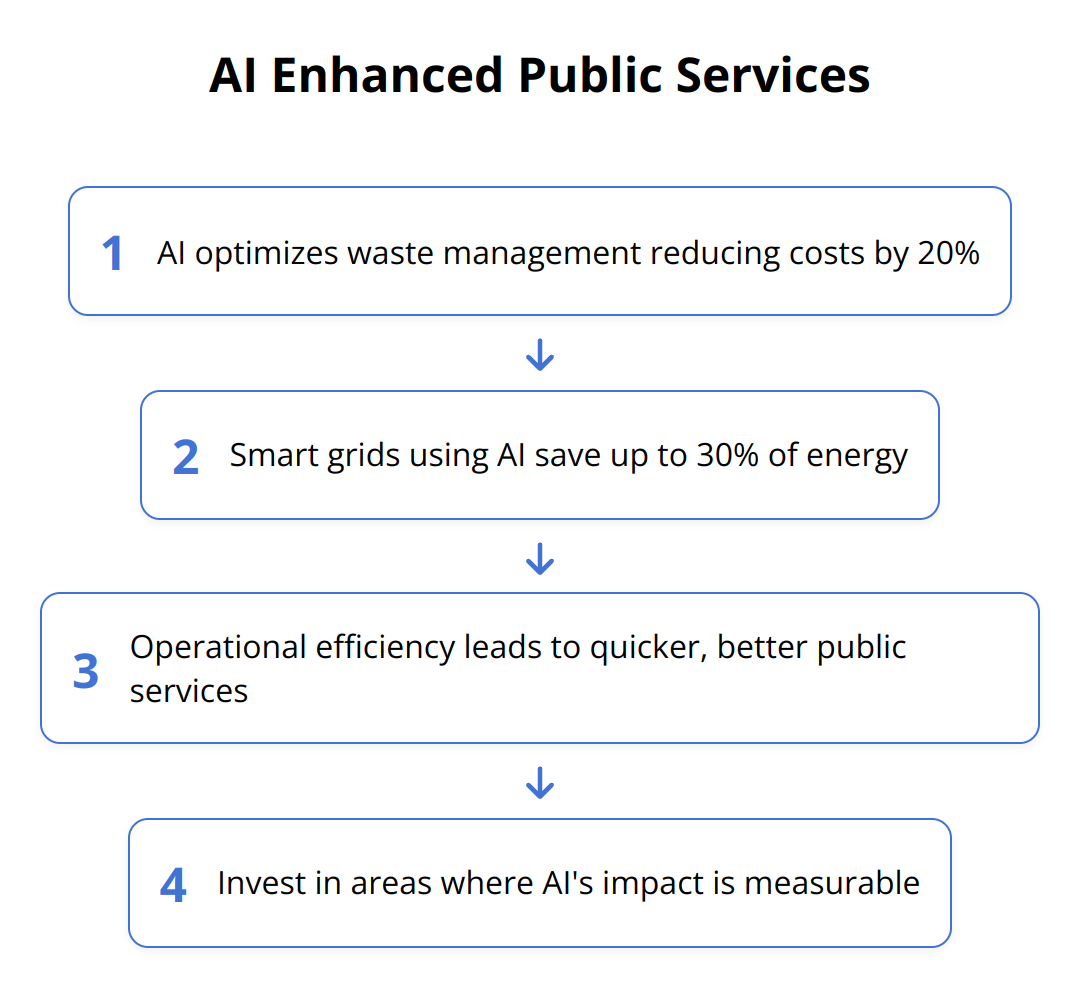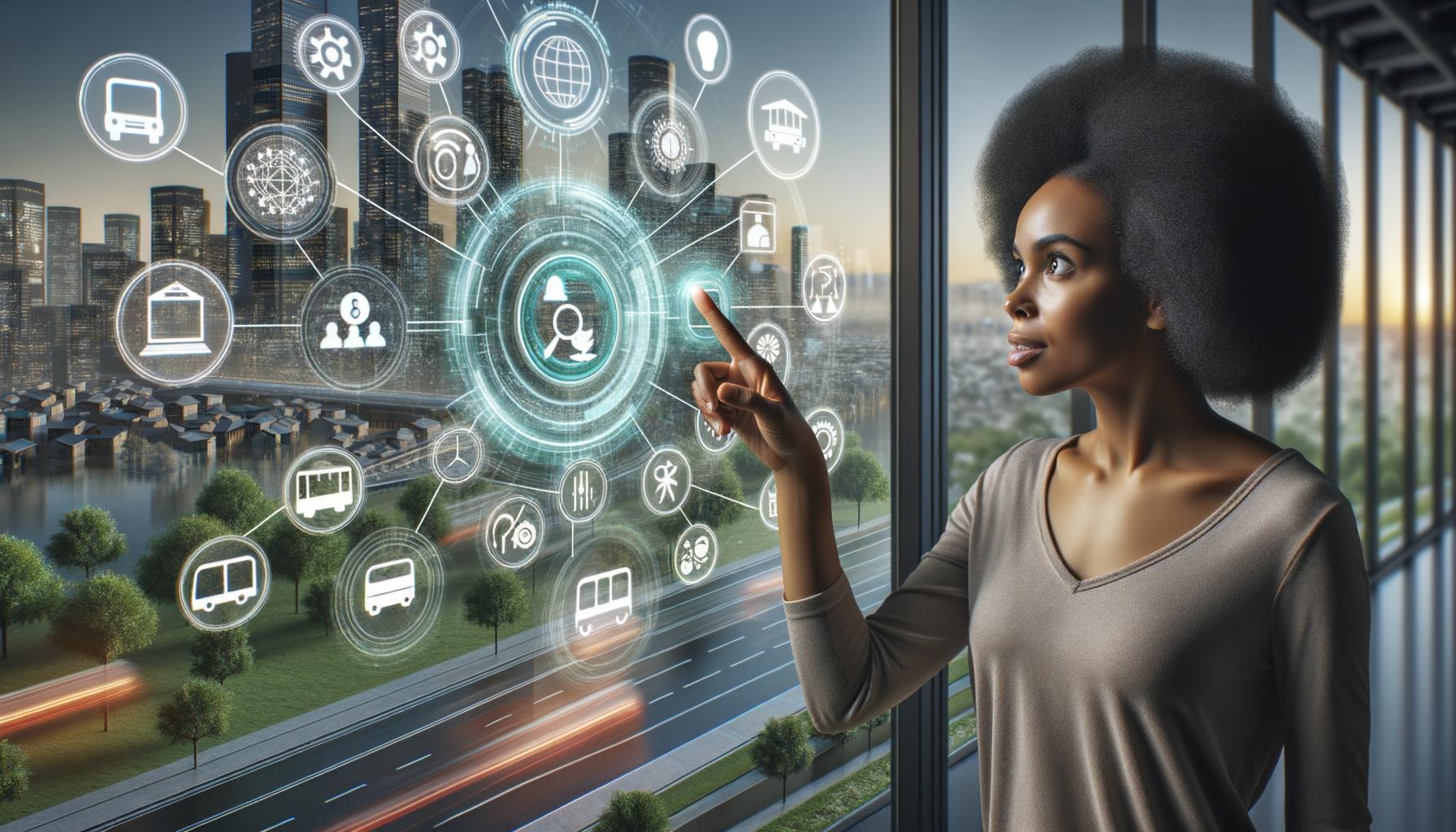Artificial Intelligence (AI) is rapidly reshaping how we envision urban environments, propelling cities into a more efficient and sustainable future. At FutureWave Research, we believe that understanding the role of AI in smart cities is key to unlocking these benefits.
This beginner’s guide will walk you through the basics of smart cities, the transformative role of AI, and the tangible benefits it brings to urban areas. With practical examples and insights, we aim to highlight the potential of AI in enhancing the quality of life for city dwellers and the environment.
AI in Smart Cities
Artificial Intelligence (AI) is a powerful tool that transforms urban areas into smart cities, making them more efficient, sustainable, and livable. A smart city uses digital technology to connect, protect, and enhance the lives of its citizens. AI is at the core of these transformations, offering innovative solutions to urban challenges.
Transformative Role of AI in Urban Environments
AI significantly improves urban life by making cities smarter in their response to the needs of residents and the environment. It does so in various ways:
- Enhancing Public Safety: AI-powered surveillance systems can analyze video feeds in real-time, identifying suspicious activities and helping prevent crime.
- Optimizing Traffic Management: AI algorithms can predict traffic congestion and adjust traffic signals accordingly to reduce wait times and improve traffic flow.
- Improving Energy Efficiency: Smart grids, powered by AI, can analyze energy consumption patterns and distribute energy more efficiently, reducing waste.

Practical Applications of AI in Smart Cities
Let’s explore some specific examples of how AI is applied in smart cities:
- Waste Management: AI monitors waste levels in bins and predicts when they will be full, optimizing collection routes and times, which results in cleaner streets and cost savings.
- Water Management: AI systems predict water demand and detect leaks in real-time, ensuring efficient water use and conservation.
- Public Transportation: AI optimizes bus routes and schedules based on real-time data regarding traffic conditions and passenger demand, enhancing the public transport experience.
- Air Quality Monitoring: AI analyzes data from sensors across the city to provide real-time air quality updates, allowing residents to make informed decisions about outdoor activities and helping city planners reduce pollution.

Steps Forward
Adopting AI in urban planning is not without its challenges, including data privacy concerns and the need for significant investment. However, the potential benefits far outweigh these hurdles. Cities that embrace AI can enhance their efficiency, sustainability, and quality of life for residents. As more cities adopt AI technologies, it’s vital for city planners, technologists, and citizens to work together to ensure these technologies are used ethically and effectively.
For those interested in exploring further, the incorporation of AI in urban development represents not just a technological shift but a profound change in how we envision living in our cities. As AI continues to evolve, so too will the smart cities of the future, offering unparalleled opportunities for innovation and improvement in urban life.
AI Solutions in Urban Planning
Artificial Intelligence (AI) is revolutionizing urban planning by addressing some of the most pressing challenges cities face today. Here, we focus on practical AI solutions for traffic management, waste management, energy optimization, public safety, and surveillance.
Transforming Traffic Management
In the realm of traffic management, AI systems significantly reduce congestion. For example, the city of Pittsburgh implemented AI-based traffic signal optimization, leading to a 25% reduction in travel times. Practical tips for cities include adopting AI traffic prediction models and integrating them with existing traffic light systems to dynamically adjust signal timing based on real-time traffic conditions.

Streamlining Waste and Energy Management
For waste management, cities like Seoul have seen a 20% decrease in waste collection costs by using sensors and AI to optimize collection routes and schedules. Cities should consider deploying smart bins with fill-level sensors connected to AI systems for efficient route planning for waste collection trucks.
In energy optimization, AI identifies patterns in energy consumption, enabling smart grids to balance supply and demand more effectively. A case in point is the city of Amsterdam, which uses AI algorithms to manage its electric grid, resulting in energy savings of up to 30%. Cities looking to reduce energy waste should invest in AI-driven smart grids that analyze consumption data to distribute electricity more efficiently.
Enhancing Public Safety with AI
Public safety and surveillance benefit significantly from AI. London, for example, uses AI-driven surveillance to identify and address crime hotspots effectively, contributing to a 4% reduction in crime rates. Cities aiming to improve public safety should employ AI surveillance systems capable of real-time analysis and anomaly detection to swiftly identify potential threats.
Actionable Insights and Best Practices
- Implement AI-based traffic signal optimization, monitoring its impact on congestion and travel times.
- Deploy smart waste management solutions such as AI-enabled sensors in bins to optimize collection routes and schedules.
- Invest in AI-driven smart grids for energy optimization, focusing on reducing energy consumption and costs.
- Utilize AI for public safety surveillance, integrating real-time analysis capabilities to enhance crime prevention efforts.
By adopting these AI solutions, cities can make significant strides in becoming smarter and more sustainable, ultimately improving the quality of life for their residents. The journey towards integrating AI into urban environments requires collaboration, investment, and a commitment to innovation. As cities continue to evolve, AI stands out as a key enabler of future urban transformations, making it essential for urban planners and technology leaders to embrace these solutions.
Why Implement AI?
Artificial intelligence (AI) isn’t just a buzzword; it’s a robust solution that propels urban environments into the future. Integrating AI into cities leads to more efficient public services, a higher quality of life for residents, and a strong push towards environmental sustainability. Let’s explore how.
Efficiency in Public Services
One of AI’s standout achievements is its ability to streamline and enhance public services. By applying AI in areas like waste management and energy use, cities can achieve remarkable improvements in operational efficiency. For instance, Seoul reduced its waste collection costs by 20%, thanks to AI. Similarly, AI-driven smart grids in Amsterdam led to energy savings of up to 30%.
Practical Tip: Cities should invest in AI solutions for public services, starting with areas where the largest impact can be measured.

Quality of Life for Residents
AI directly contributes to the well-being of urban populations. With AI-enabled public transportation systems, residents experience shorter wait times and less crowded rides. AI’s role in improving air quality and public safety significantly boosts life quality by creating safer, cleaner, and more livable urban environments.
Practical Tip: Engage with technology providers to pilot AI applications in critical areas affecting residents’ daily lives.
Environmental Sustainability
The push toward sustainability is more critical than ever, and AI plays a pivotal role. AI’s ability to monitor and manage energy and water resources can lead to significant reductions in waste and overuse. Moreover, AI-driven initiatives in cities can contribute to achieving sustainability goals by optimizing resource distribution and reducing carbon footprints.
Practical Tip: Prioritize the implementation of AI technologies that align with your city’s sustainability goals, focusing on quick wins in energy and waste management.
In summary, the adoption of AI in urban environments is not just about tapping into new technologies. It’s about making a commitment to a future where cities are more efficient, people live better, and our environmental footprint is minimized. The journey toward smarter cities is filled with challenges, but the potential rewards make it a path worth pursuing.
Wrapping Up
The exploration of AI’s impact on smart cities reflects a broad spectrum of benefits and challenges. By incorporating AI, cities have transformed into ecosystems that are not only more efficient but also significantly improve the quality of life for their residents while marching towards environmental sustainability. The practical examples from cities around the globe underscore AI’s potential in revolutionizing urban environments – from optimizing traffic management and enhancing public safety to streamlining waste and energy usage.
![Key Takeaways - AI for Smart Cities [Beginner's Guide]](https://futurewaveresearch.org/wp-content/uploads/2024/03/AI_for_Smart_Cities__Beginner_s_Guide__5_2024_03_31_07_10_35_361329_00_00.png)
Future prospects of AI in smart cities are promising, with the technology poised to introduce even more innovative solutions that could redefine urban living. However, this journey is not without its hurdles. The adaptation to AI demands considerable investment, not just financially but also in terms of building a society that is open to and prepared for such technological advancements. Challenges such as data privacy, ethical considerations, and ensuring equitable access to technology remain at the forefront of discussions regarding smart cities.
We at FutureWave Research are optimists at heart, and we encourage cities worldwide to embrace AI solutions. The path toward smart cities is a collaborative effort that requires partnership between governments, technology providers, and citizens. It is a commitment to a future where technology serves as a backbone for sustainable urban development.
For those interested in staying at the forefront of technological innovations in AI and beyond, we invite you to join our newsletter. At FutureWave Research, we’re dedicated to guiding organizations and governments toward impactful advancements, leveraging technology for positive change. Join us in shaping a tech-driven future that enhances lives globally.
In closing, the integration of AI into urban planning is not just a trend; it’s a necessary evolution to address the complex challenges of modern urbanization. As we look towards the future, the potential of AI in crafting the smart cities of tomorrow is boundless. The journey is just beginning, and the opportunities for innovation and improvement in urban life are limitless.

